The Programme and Project Partners - Social Impact Toolkit
Updated 20 January 2023
1. Introduction
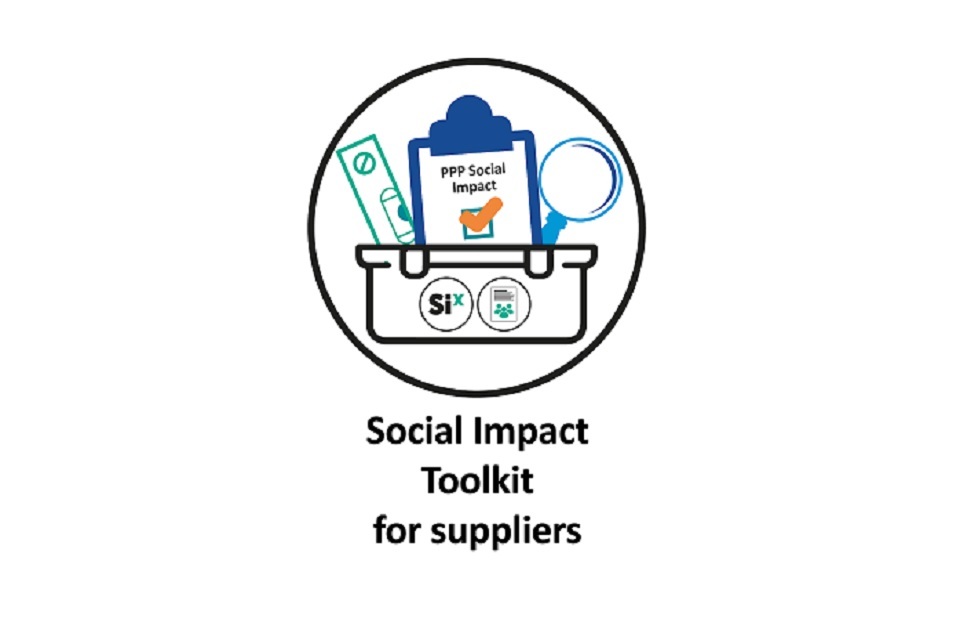
Social Impact Toolkit for suppliers
Following on from the Social Value Act 2012, central government announced it would go further and explicitly evaluate social value when awarding most major contracts.
Since 01 January 2021, the Social Value Model must be applied to all new procurement activity so, for any major procurement, you will be asked to outline your commitment detailing how you will support the partners to deliver the maximum social impact for our local communities through your response to specific social impact questions.
This Social Impact Toolkit is designed to help The Programme and Project Partners supply chain partners understand what social impact is, why it is important, how to embed it into the procurement process and how they can support positive changes in the community.
The Programme and Project Partners was formed by Sellafield Ltd in 2019 - bringing in KBR, Doosan Babcock, Jacobs and Morgan Sindall Infrastructure - to transform major project delivery at the nuclear site.
As part of The Programme and Project Partners, our supply chain will deliver approximately £5 billion of the £7 billion spend, this can have a significant positive impact on the economic, social and environmental wellbeing of our local communities.
By working together, we can ensure we unlock social value and deliver a real, meaningful change which will directly impact the communities we are working in.
It is worth noting that all impacts are important and should be considered in the context of each project, programme, or organisation.
To this end, our supply chain should focus on commitments which can be delivered on and those that create positive change.
In 2018, Oxford Economics, a leading organisation in global forecasting and quantitative analysis, demonstrated the significance of Sellafield’s contribution to the UK economy and the positive social impact felt locally and nationally.
They also highlighted risks around local economic diversity and resilience in their report.
We also provide a key capability in the Warrington area.
By supporting our communities to exploit and develop their capabilities, we will enable them to generate greater value and drive economic diversification.
2. What is social impact?
The Programme and Project Partners social impact team defines social impact as the life changing effect that our business actions have on people and the community.
Ultimately, it’s about creating permanent, positive and significant social, environmental or economic change through deliberate activities which change people’s lives in West Cumbria and Warrington.
We identify 2 categories of social impact, embedded and additional.
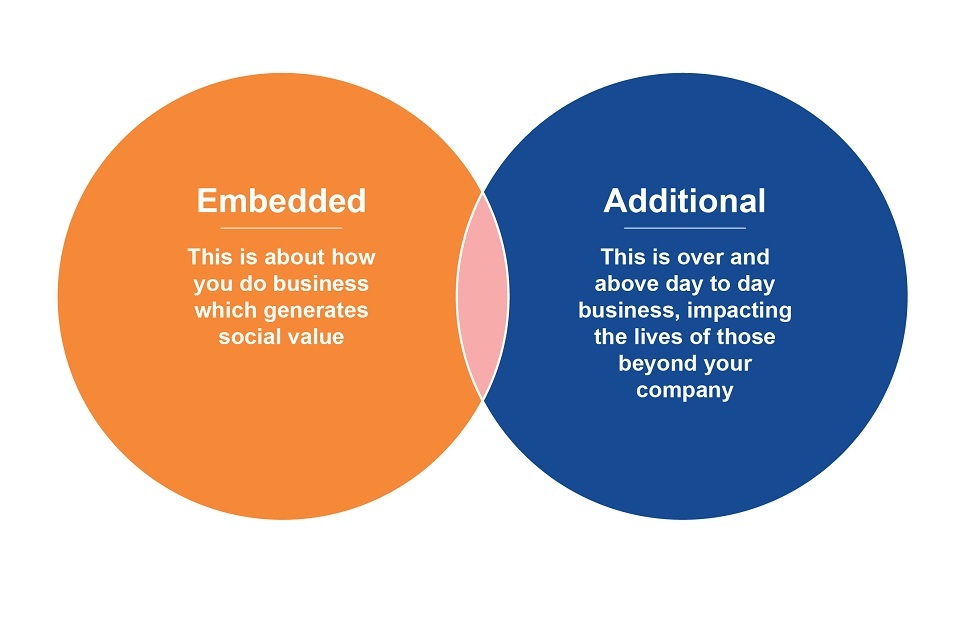
Embedded and additional graphic
All contracts at Sellafield will have an embedded social value.
This is the social value that is gained purely as a by-product of having the workforce you need to deliver the work, through existing company activities or activities which would be expected of any responsible business.
Examples of embedded social value include, but are not limited to:
- employing people in line with your resource plan
- Transfer of Undertakings Regulations 2006 (TUPE) of existing workforce
- ensuring 5% of your workforce are apprentices (an industry standard)
- delivering work experience, science, technology, engineering, arts and maths (STEAM) or education outreach and career activities in isolation or entirely specific to your own organisation
- improving your own internal working practices which address workforce inequality or health and wellbeing
It’s still important to measure and account for embedded value using tools like Sellafield themes, outcomes and measures (TOMS’s) but within your tender response we expect you to detail your commitments to deliver additional social value, above and beyond the basic workforce needs for contract delivery.
Examples of additional social value include, but are not limited to:
- commitments that show how a proportion of workforce and trainees will be recruited from disadvantaged backgrounds
- upskilling activities which have a wider recognised or accredited benefit beyond your current or future workforce
- working collaboratively to deliver education activity which is focussed on improving students’ educational outcomes or employability prospects
- commitments to use the skills and resources within your organisation to deliver long term and sustainable activity which addresses known local needs (i.e. skills-based volunteering, supporting COVID-19 recovery etc)
- maximising the impact through flowing down commitments within your supply chain
- identifying further business opportunities within your organisation or your supply chain beyond the contract delivery which could be delivered from the local area
In tenders we are looking for embedded and additional impact.
3. Where social impact should be delivered
The Nuclear Decommissioning Authority (NDA) have a responsibility to fulfil socio-economic requirements under the Energy Act (2004) to help maintain sustainable communities around their sites leading up to and after eventual site closure.
To do this, communities should be supported to:
- enhance the opportunity for local people to be involved in decommissioning work and other economic activity through education, retraining and skills development
- increase the attractiveness of areas near NDA sites as places to live, work and invest, in an effort to secure future economic sustainability
- work with nuclear new build and adjoining site organisations to ensure that the workforce and local communities are best placed to maximise the benefits and opportunities presented
- support the diversification of local economies into other sectors – reducing the reliance of communities on nuclear sites for employment by increasing the number, variety and vibrancy of local businesses, promoting entrepreneurship and taking steps to attract new enterprises.
In 2017, Oxford Economics were commissioned to determine the economic impact that Sellafield has on communities.
It found that:
In Copeland:
- Sellafield Ltd provides 58.7% of all jobs (directly and indirectly)
- Sellafield contributed to 59.4% of the boroughs gross valued added
- the borough benefits from 55.9% of Sellafield Ltd wage bill (£264 million)
In Allerdale:
- Sellafield Ltd provides 4.4% of all jobs (directly and indirectly)
- Sellafield contributed to 4.4% of the boroughs gross value added
- the borough benefits from 25.8% of Sellafield Ltd wage bill (£121 million)
In Warrington:
- Sellafield Ltd provides 2.8% of all jobs (directly and indirectly)
- Sellafield contributed to 2.9% of the boroughs gross value added
- the borough benefits from 3.4% of Sellafield Ltd wage bill (£16 million)
Therefore, as the area’s most reliant on Sellafield and who are most economically impacted by our activity, we expect your social impact commitments to focus on creating long term sustainable impact within West Cumbria (Copeland and Allerdale) in line with Sellafield Ltd’s Social Impact Strategy.
4. Why does social impact matter to Sellafield Ltd and The Programme and Project Partners?
The Sellafield mission will last into the next century and as such there is a legal, moral and ethical responsibility to maximise social impact for current and future generations.
With over £7 billion of projects identified to pass through The Programme and Project Partners, a collaborative, joined-up approach to social impact is essential to enable it’s success.
From the Social Value Act in 2012 to the Public Procurement Notice (PPN) 06/20 issued in late 2020, the messaging from government is very clear on the expectation of greater value from every taxpayer pound spent.
This wider value is a key component of delivering The Programme and Project Partners benefits and critical success factors which drive everything we do. The benefits include creating opportunities for local people, increasing value for the UK taxpayer, improving cost and schedule certainty in major project delivery, accelerating high hazard reduction and, in turn, seeing Sellafield Ltd recognised for project delivery excellence.
The West Cumbria challenge:
- higher than average poverty rates
- more than 20,000 people in debt
- 10,000 households with an income of less than £10,000 a year
- 3,900 children living in poverty
- more children in care than in any other part of Cumbria
- teenagers achieve fewer GCSEs than the national average
- high levels of youth unemployment
- 1 in 4 people over 16 years has no qualifications
- low rates of business and social enterprise start-ups
5. Social impact themes
The Programme and Project Partnership Social Impact Strategy aligns with Sellafield Ltd’s Social Impact Strategy – Social Impact, Multiplied (also known as SiX).
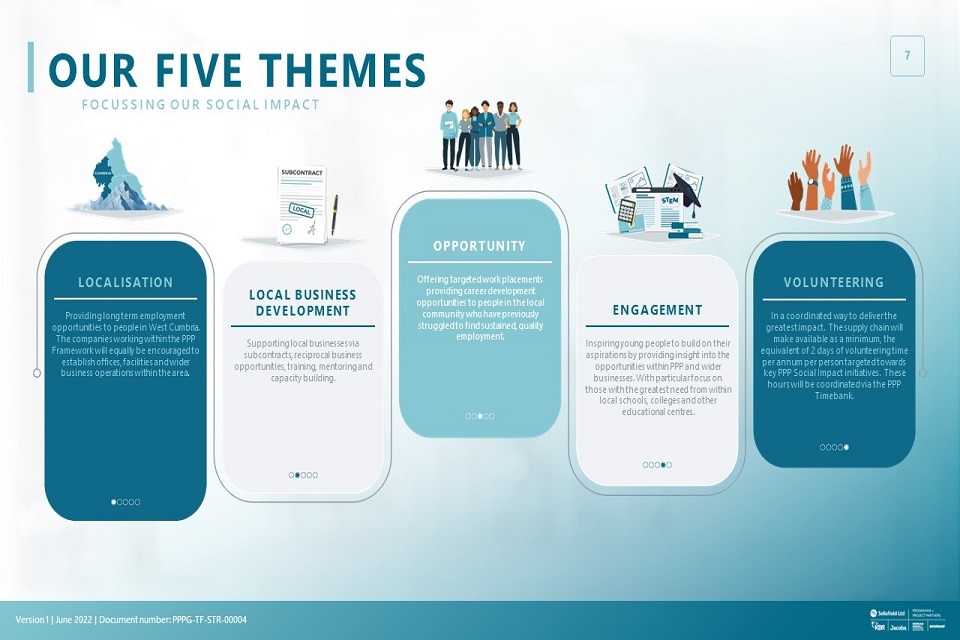
Our five themes
The themes of our strategy are:
5.1 Localisation
Localisation is at the heart of Programme and Project Partners. In the context of the partnership, localisation is primarily focused on West Cumbria.
All companies involved in Programme and Project Partners work will be encouraged to support this agenda, through location of their businesses and long-term employment of local personnel.
Suppliers will benchmark their current state and declare targeted states throughout their involvement in the project. Local first for recruitment and purchase of goods and services.
What is localisation?
Using Programme and Project Partner contracts to enable the establishment of offices and facilities that will provide employment and opportunities beyond both the contract and Sellafield Ltd work scope, building a stronger economic infrastructure.
Why localisation?
The local area is reliant on Sellafield. The goal is to increase the number of businesses in the area and in time, increase the number of opportunities outside of Sellafield.
How can the supply chain support localisation?
By seeking to operate in and from the local area. By working with partners like the Industrial Solutions Hub.
Localisation case study
E J Parker open regional office in Whitehaven, providing opportunities for local employment.
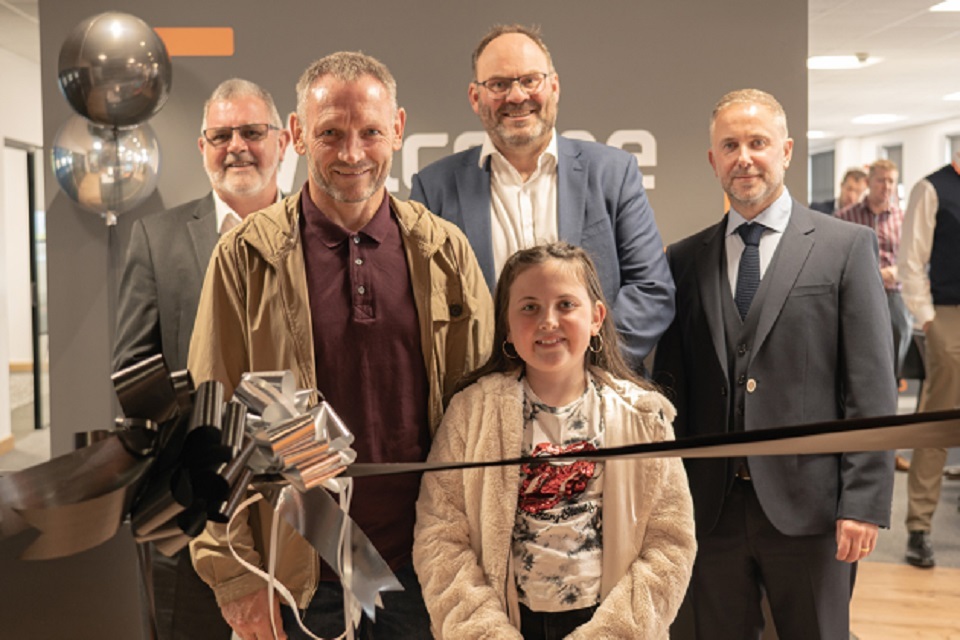
Localisation
5.2 Local development
Local development, alongside direct localisation support, suppliers will be encouraged to develop local supply companies including reciprocal opportunities for diversification, mentoring and support to the Programme and Project Partners Supply Chain Academy.
These initiatives will be supported using contract driven requirements.
What is local business development?
Supporting local businesses via subcontracts, reciprocal business opportunities, training, mentoring and capacity building
Why Local Business Development?
We have a higher rate of business closures, than start-ups in the local area. The goal is to support a more resilient economy. A place where businesses thrive.
How can the supply chain support local business development?
Providing/enabling expert business advice and mentoring to build (local) business capacity.
Gain reciprocal business opportunities (beyond the partnership and Sellafield Ltd work scope) Including businesses and social enterprises beyond the immediate supply chain.
5.3 Opportunity
The Programme and Project Partners and its supply chain will support back to work and get into work programmes, including but not limited to the Programme and Project Partnership Internship Scheme and or ‘All Together Cumbria’.
The opportunity to create social impact through employment is a key part of the partnership’s social impact plan.
What is opportunity?
Offering targeted work placements providing career development opportunities to people in the local community who have previously struggled to find sustained, quality employment.
These opportunities will provide qualifications, skills and experience and/or support networks.
Why Opportunity?
One in 4 people in the local area don’t have a qualification. The area has high levels of low skills but many national and international companies on the doorstep – offering high quality employment.
The opportunity to create social impact through employment is a key part of the partnership’s social impact plan.
Creating Employment Opportunities will enable the supply chain to focus on social value-added employment activities.
How can the supply chain support the opportunity theme?
By supporting training, work placements and by offering support networks via agreed programmes – eg the Programme and Project Partnership Internship Scheme and the Princes Trust ‘Get Into’ programmes.
Opportunity case study
- Case study - The Programme and Project Partnership Internship Scheme
The Programme and Project Partnership Internship Scheme is designed to support residents of West Cumbria who face additional barriers to entering long-term, sustainable, quality careers.
It does this through a programme which aims to build:
- qualifications, skills and experience
- a supportive network of connections. Research shows this is just as important as qualifications and skills in building successful careers
There will be 2 cohorts each year which will start in April and October.
How does this align?
- objective: sustainable incomes
- Theme: opportunity
- priority: increase employability prospects of those currently unemployed or underemployed.
- embedded impact
How can you get involved?
Identify a role or roles in your team suitable for someone who is new to the nuclear industry and starts in either April or October.
These roles should be in areas where you know there is a long-term skills shortage. The roles will include 75% development time for the first 6 months and 25% development time for the next 12 months.
You’ll need to put in place:
- a job description. Please make sure this is written in plain English and uses gender neutral language. There are free tools online to check this for you
- a paid role; interns are paid the national living wage
- a suitable line manager, buddy and mentor. We will provide support and guidance for these roles.
For more information email: social.impact@sl-ppp.co.uk
- All Together Cumbria - is a community interest company (CIC), investing in providing the people of Cumbria with opportunities and access to employment.
Through the operation of the recruitment desk, revenues are generated for re-investment in skills and employability programmes, providing opportunities for individuals and enabling businesses to develop a more sustainable local workforce.
It does this by enabling and empowering people into meaningful employment including widening opportunities for workforce participation amongst under-represented groups.
Providing greater opportunity for career advancement for people living and working in Cumbria and assisting in the development of the Cumbrian workforce to meet skills challenges.
- Creating Careers in Cumbria - Employability Development Programme, supported by local and national organisation.
The target group are those unemployment and nearest to the jobs market. The programme runs for 7 weeks in total: 1 week outward bound, 2 weeks training followed by 4 week work placement with aims to increase their prospects of future employment
5.4 Engagement
Engagement with local schools, colleges and other education establishments will be co-ordinated and encouraged. Special attention should be given to those from disadvantaged backgrounds.
What is engagement?
Collaborating with education programmes to deliver significant positive change to the potential of our local young people.
Why Engagement?
Research shows social capital (the networks or relationships among people) has a major impact on young people. The goal is to ensure young people locally understand the opportunities available.
In West Cumbria, some secondary schools have progress scores below national average, 17% of children have special educational needs, 1 in 4 adults have no qualifications, 3,900 children live in poverty.
How can the supply chain support the engagement theme?
By helping to enable pupils to reach their full potential and access and improved future.
- partnering agreement with Primary Business Partnership (PBP) supporting career related learning in West Cumbria (primary schools) and/or participation in other Programme and Project Partners recognised schemes such as the Primary Reading Programme.
For more information on the PBP, email: info@pbp.org.uk
You can also find out more here: www.primarybusinesspartnershp.org.uk
- partnering agreement with the ‘Link’ supporting career activities in West Cumbria (secondary schools) and/or participation in other Programme and Project Partners recognised schemes such as ‘class of your own’.
For more information on the ‘Link’, email: deborah.naylor@inspira.org.uk
You can also find out more here: The Link (inspira.org.uk)
- delivering contribution to the engagement theme via other programmes/schemes. (must compliment not duplicate existing schemes)
For addition information on Programme and Project Partners education programme, i.e., required levels of involvement/commitment, email: social.impact@sl-ppp.co.uk
Case study - Primary Business Partnership
The Primary Business Partnership connects primary schools with people from local businesses in Copeland and Allerdale.
Professionals from the business community are invited to support career-related learning activities that help inspire the next generation of young people.
The scheme was founded by OneAIM to create a sense of aspiration and awareness of the broad range of careers available in Cumbria.
Activities can include aspirations sessions, science, technology, engineering, arts and mathematics (STEAM) sessions or reading clubs.
This learning is focused on helping young people to understand who they could become and help them to develop a healthy sense of self.
The service is not about making career choices but more about exploration, development and helping children with their aspirations.
The Primary Business Partnership works with all 102 primary schools across Copeland and Allerdale.
Coordinating the efforts of businesses ensures all children in the area benefit from career-related learning activities.
How does this align?
- objective: sustainable incomes
- theme: engagement
- priority: increasing aspirations and relevant skills base in young people to enable them to succeed in their career
- added impact
How can you get involved?
By committing corporate volunteering time.
One activity would typically take 2 to 3 hours (including preparation). Participation can be in person or via virtual delivery.
What would we do?
Staff from your business (in person or virtually) can support career-related learning through skills-based volunteering. This could be a one off or through a longer-term commitment.
For more information email: info@pbp.org.uk
You can also find out more here: www.primarybusinesspartnershp.org.uk
5.5 Volunteering
Volunteering in a co-ordinated way is a key form of community engagement. The expectation is that the supply chain will commit corporate volunteering time towards key Programme and Project Partners social impact initiatives.
These activities will be monitored and controlled via the Programme and Project Partners Timebank.
What is Volunteering?
Harnessing the often un/under used supply chain volunteering capacity in a coordinated way to deliver the greatest impact; using the skills at our disposal to address social issues at root cause.
Why Volunteering?
Corporate volunteering is a key part of how businesses can support social impact initiatives.
Coordinating this at programme level, allows for a targeted approach to deliver the greatest impact and focuses effort on initiatives that address root cause and support thriving communities.
How can the supply chain support volunteering?
Coordinating all corporate volunteering time within Programme and Project Partners via the Timebank.
What is Timebank?
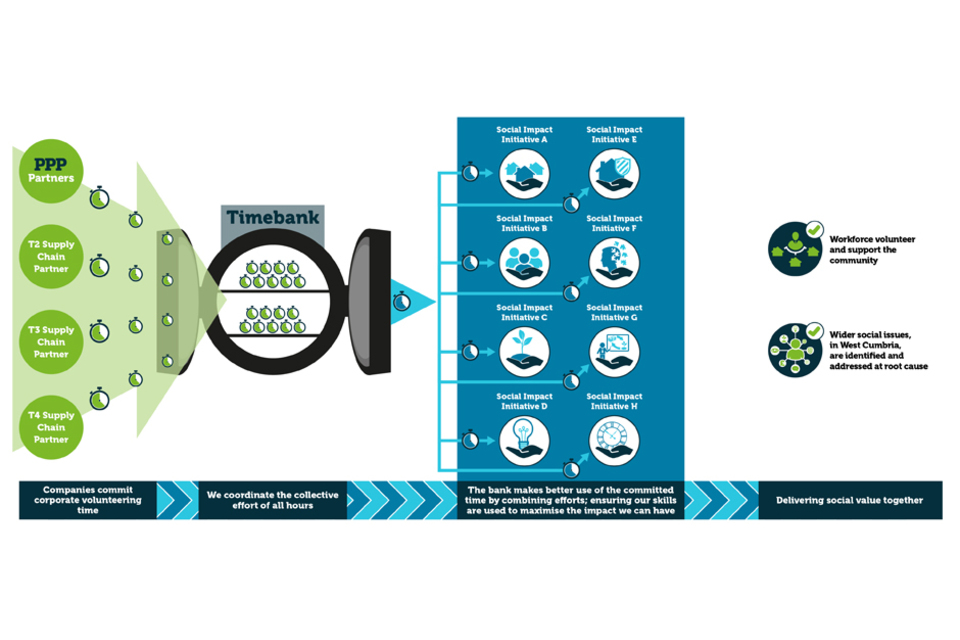
Timebank
Timebank is a system we have created within the partners which uses the credits of ‘time’ rather than money for the purpose of supporting social impact initiatives.
Timebank coordinates corporate volunteering efforts centrally. Hours committed will be invested against the priorities of Timebank.
This is a simple ‘plug and play’ initiative which supply chain can connect into.
As a minimum, we expect supply chain partners to contribute 2 days, per full time equivalent (FTE) per year.
This is how it works:
- Programme and Project Partners and its supply chain ‘bank’ hours into Timebank.
- Programme and Project Partners identifies initiatives which can deliver meaningful social impact.
- Programme and Project Partners communicates these opportunities to all Timebank contributors. Supply chain can then decide whether to support said social impact initiatives.
- Programme and Project Partners evaluates the impact and reports on behalf of all.
6. Social impact in procurements
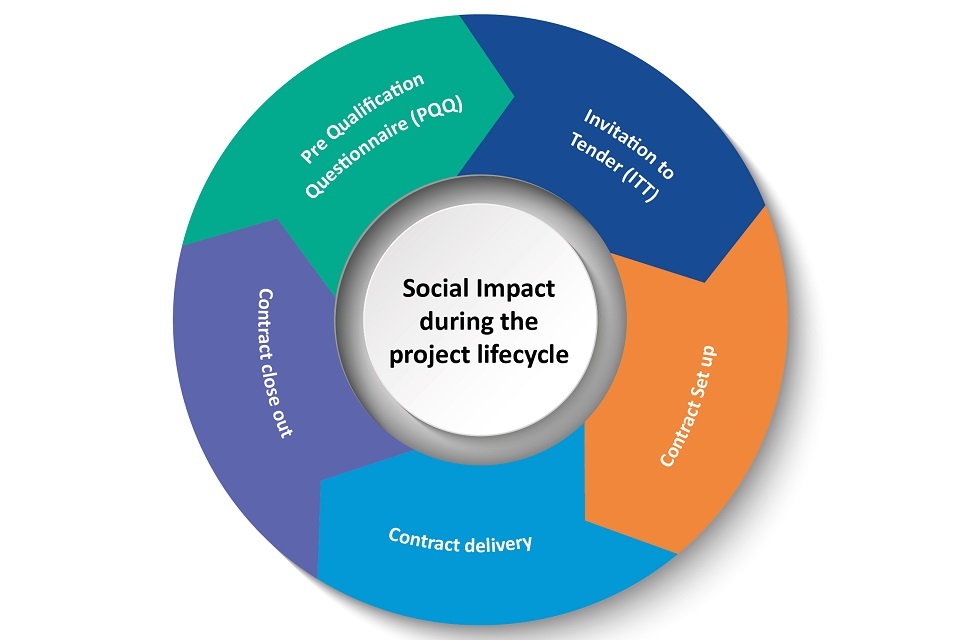
Pre-contract to contract close out
We have 2 common ‘routes to procurement’.
Social impact is factored into both.
Tenders
A formal, structured procedure for generating competing offers from different potential suppliers or contractors looking to obtain an award.
Direct Awards
A negotiation with one supplier without a competitive process. This typically happens for expedience or where only one supplier can offer the service.
If we are asking you to support a package for the next 18 years, the social impact you can deliver is very different to a company who have a 6-month contract. There is no one-size-fits-all.
Pre contract
For tenders – Invitation to tender, include a minimum 10% social impact weighting.
For direct awards – we have a minimum expectation, you can sign up to this or we can negotiate an alternative.
Contract setup
We agree Key Performance Indicators (KPI’s). If you have a long-term commitment, we might want to agree a plan.
Delivery stage
We will monitor the KPI’s. We will also ask for completion of an annual impact report (this will usually be linked to your KPI’s requirements).
Contract close out
Social impact is an integral part of the contract close-out process, prior to the close-out of any contract, the supplier will be requested to submit and end of contract report confirming that the agreed social impact commitments have been completed.
The social impact team will validate the report and any supporting evidence and confirm status. (under performed, met expectations, exceeded expectations).
Supplier social impact delivery (including failure) is reported upwards to the Programme Project Partners Management Board.
7. Social impact key performance indicators
Social impact commitments are embedded in awarded contracts using Key Performance Indicators (KPIs).
In the case of social impact KPIs, these are aligned with Sellafield Ltd’s Social Impact Strategy and the partnerships full business case benefits.
The KPI:
- makes commitments tangible
- aligns under one strategy so we deliver meaningful impact
Typically, a social impact KPI will include a series of measures, each with targets. We measure the performance of each target and the collective.
We agree at contract setup what is under performing, meeting expectation and expectational.
Those underperforming or achieving expectational are highlighted to the partnerships management board.
Example KPI measures:
Embedded: X number of local people transitioned into employment through an agreed back to work, into work or upskilling scheme.
Additional: X number of reciprocal business opportunities for local small businesses based in West Cumbria.
Every contract we let from April 2021 will have a KPI.
Every supplier will be expected to submit an annual social impact report. The partners social impact team will assist supply chain partners in completion of this report.
8. Understanding the impact
It is important that we understand the proposed impact.
We do not always ask you to formally reference attribution, displacement, or deadweight during a tender, but it’s worth understanding the terminology when you submit proposals and ensuring that your tender submission is clear about your intended impact.
Attribution is an assessment of how much of the outcome was caused by the contribution of other organisations.
Displacement is about how much of the outcome displaces other outcomes.
Deadweight is a measure of the amount of outcome that would have happened even if the activity had not taken place.
A great example of attribution is contract employment and subcontract spend. If you bid for work with the partnership, please do not advise that you will employ X number of people or spend £X unless you are doing something over and above what another contractor would be doing.
Remember, it is important to be clear – ‘what is the change we are making because of our commitment’.
Think:
- How much of this is because of us?
- Are we simply creating another problem elsewhere?
- How much of this would happen regardless of what we do?
9. Useful links and documents
SiX – Sellafield Social Impact Programme
Oxford Report-The Impact of Sellafield Ltd
Cumbria Community Foundation report- The opportunities and challenges in West Cumbria
10. Social impact commitment
To support supply chain partners, we have outlined a simple structure for how supply chain partner commitments can be made in social impact plans.
| What is the commitment? | |
|---|---|
| Programme and Project Partners theme | Localisation/local business development/opportunity/engagement/volunteering |
| The story of change | |
|---|---|
| The people who will benefit | |
| Number involved per year | |
| How often Is the commitment? | Monthly/yearly/one-off |
| What is their participation? | |
| What is the outcome? | |
| Numbers impacted | |
| What would happen anyway or due to others? |
11. Future updates
We will continue to update this toolkit; in the next update we will add:
- more case studies
If you have any thoughts on useful additions, then please contact:
Luke Richardson, Programme and Project Partners Head of Social Impact social.impact@sl-ppp.co.uk
If you wish to sign up to our ‘Social Impact Supply Chain Newsletter’. then click on the link to register.

